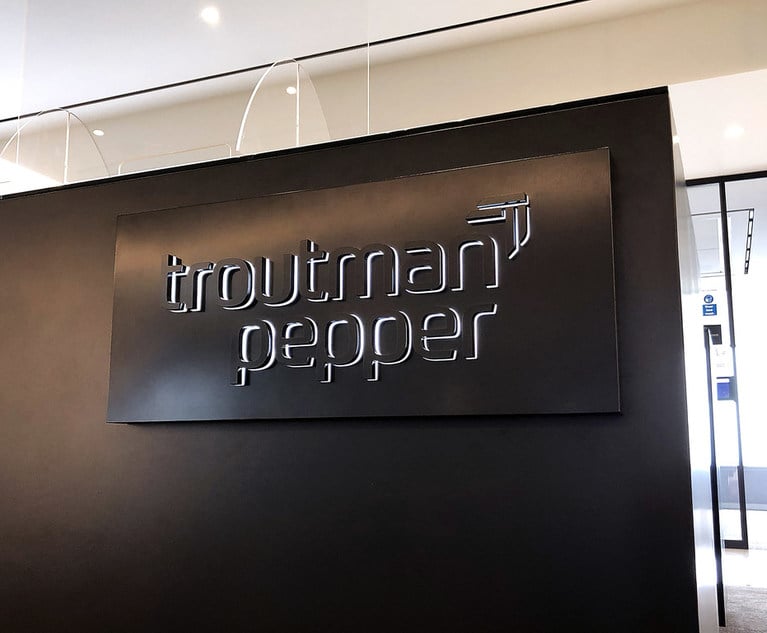The Importance of Treating Nonattorney Staff Well
Your first few weeks as a young attorney at a new job (in the public or private sector) will be a whirlwind of trainings, signing forms, meeting your fellow attorneys and potentially even getting that terrifying first assignment. It should also involve introductions to your nonattorney colleagues—assistants, paralegals, office managers, supply managers, etc. While it is obviously critical for you to produce an excellent work product and develop a good reputation for yourself among your fellow attorneys, it is equally critical—though too often overlooked—that you learn (and quickly) how to properly interact with and treat your nonattorney colleagues.
August 09, 2017 at 04:45 PM
5 minute read
Your first few weeks as a young attorney at a new job (in the public or private sector) will be a whirlwind of trainings, signing forms, meeting your fellow attorneys and potentially even getting that terrifying first assignment. It should also involve introductions to your nonattorney colleagues—assistants, paralegals, office managers, supply managers, etc. While it is obviously critical for you to produce an excellent work product and develop a good reputation for yourself among your fellow attorneys, it is equally critical—though too often overlooked—that you learn (and quickly) how to properly interact with and treat your nonattorney colleagues.
What you are not taught in law school is that your nonattorney colleagues are actually the key to your success or failure as an attorney. What do I mean? Well, who do you think is going to teach you even the most basic tasks necessary to function an attorney: how to draft a letter on firm letterhead, how to print and (more importantly) where the printer is that you just printed to, how to send a fax, how to create a conference call-in number, how to upload documents to review, how to reserve a conference room, and the list goes on and on. These are all things you will need to know as an attorney and your nonattorney colleagues know the answers.
It is an unfortunate reality that your nonattorney colleagues, so-called “staff,” are often marginalized, considered easily replaceable, the first to go in any economic downturn, and, worst of all, too easily treated as second-class citizens—usually by insecure or self-centered attorneys who think their status as an attorney somehow grants them the right to treat others working with them (not for them) poorly. Because of the importance of nonattorneys to your position as an attorney, you should heed the following advice to ensure you create an effective, collegial and helpful working relationship with your nonattorney colleagues.
Be Appreciative, Not Entitled
It is a critical error (and demonstrates a glaring lack of social awareness/tact) to assume that because you decided to go to law school and someone else did not or had the advantage and means of going to law school that you can now treat those who might not have had the same benefits worse than you would your attorney colleagues. While there are of course going to be nonattorney colleagues who are not competent, most nonattorney colleagues, at least in my experience to date, are quite the opposite. Treating nonattorney colleagues poorly simply because they are nonattorneys not only adversely affects their motivation to help you (something you do not want to do when there is an emergency and you need help), but also damages your reputation with attorneys and nonattorneys alike. Even if a nonattorney colleague is just doing their job, there is no reason not to say “thank you” or show your appreciation for their efforts.
Be Friendly From the Start
As a young attorney at a new job, you are going to be slightly overwhelmed (whether you outwardly show it or not)–if you are not, please call or email me to let me know your secret. However, despite the newness of the situation, you should not let the pressure of this busy work environment make you hyper-focus only on attorneys and not on your nonattorney colleagues. Always smile and try to engage in conversation. This may seem like such logical advice, but you would be surprised how many people pout or look super serious when they are walking to and from an office or cubicle. A simple smile goes a long way to engender support. You are not going to be instant friends with everyone (attorneys and nonattorneys alike), but establishing a friendly rapport with your nonattorney colleagues at the outset will only help you when you invariably need advice or guidance on how to do something.
Supplement, Do Not Replace
An effective attorney (in the public or private sector) should not only be good at research, writing and advocacy, but also know how to do the more basic tasks necessary to complete their work. What that means in real world practice is that you should know how to, inter alia, e-file, hand file, format, prepare contract templates, and even populate a table of authorities/table of contents in a brief, etc. Now this may seem like a lot of extra effort for an attorney, but such knowledge—particularly for a young attorney who may not even have the benefit of an assistant—is important in case your nonattorney colleagues are not available (which they may not be if you have a late night filing or weekend work). The key is using this knowledge effectively to not replace your non-attorney colleagues, but supplement when required and necessary. As an attorney, you are going to be busy, do not make more work for yourself when a non-attorney colleague can help.
This content has been archived. It is available through our partners, LexisNexis® and Bloomberg Law.
To view this content, please continue to their sites.
Not a Lexis Subscriber?
Subscribe Now
Not a Bloomberg Law Subscriber?
Subscribe Now
NOT FOR REPRINT
© 2025 ALM Global, LLC, All Rights Reserved. Request academic re-use from www.copyright.com. All other uses, submit a request to [email protected]. For more information visit Asset & Logo Licensing.
You Might Like
View All
Troutman Pepper Says Ex-Associate Who Alleged Racial Discrimination Lost Job Because of Failure to Improve
6 minute read
Law Firms Look to Gen Z for AI Skills, as 'Data Becomes the Oil of Legal'


Kline & Specter and Bosworth Resolve Post-Settlement Fighting Ahead of Courtroom Showdown
6 minute readTrending Stories
Who Got The Work
J. Brugh Lower of Gibbons has entered an appearance for industrial equipment supplier Devco Corporation in a pending trademark infringement lawsuit. The suit, accusing the defendant of selling knock-off Graco products, was filed Dec. 18 in New Jersey District Court by Rivkin Radler on behalf of Graco Inc. and Graco Minnesota. The case, assigned to U.S. District Judge Zahid N. Quraishi, is 3:24-cv-11294, Graco Inc. et al v. Devco Corporation.
Who Got The Work
Rebecca Maller-Stein and Kent A. Yalowitz of Arnold & Porter Kaye Scholer have entered their appearances for Hanaco Venture Capital and its executives, Lior Prosor and David Frankel, in a pending securities lawsuit. The action, filed on Dec. 24 in New York Southern District Court by Zell, Aron & Co. on behalf of Goldeneye Advisors, accuses the defendants of negligently and fraudulently managing the plaintiff's $1 million investment. The case, assigned to U.S. District Judge Vernon S. Broderick, is 1:24-cv-09918, Goldeneye Advisors, LLC v. Hanaco Venture Capital, Ltd. et al.
Who Got The Work
Attorneys from A&O Shearman has stepped in as defense counsel for Toronto-Dominion Bank and other defendants in a pending securities class action. The suit, filed Dec. 11 in New York Southern District Court by Bleichmar Fonti & Auld, accuses the defendants of concealing the bank's 'pervasive' deficiencies in regards to its compliance with the Bank Secrecy Act and the quality of its anti-money laundering controls. The case, assigned to U.S. District Judge Arun Subramanian, is 1:24-cv-09445, Gonzalez v. The Toronto-Dominion Bank et al.
Who Got The Work
Crown Castle International, a Pennsylvania company providing shared communications infrastructure, has turned to Luke D. Wolf of Gordon Rees Scully Mansukhani to fend off a pending breach-of-contract lawsuit. The court action, filed Nov. 25 in Michigan Eastern District Court by Hooper Hathaway PC on behalf of The Town Residences LLC, accuses Crown Castle of failing to transfer approximately $30,000 in utility payments from T-Mobile in breach of a roof-top lease and assignment agreement. The case, assigned to U.S. District Judge Susan K. Declercq, is 2:24-cv-13131, The Town Residences LLC v. T-Mobile US, Inc. et al.
Who Got The Work
Wilfred P. Coronato and Daniel M. Schwartz of McCarter & English have stepped in as defense counsel to Electrolux Home Products Inc. in a pending product liability lawsuit. The court action, filed Nov. 26 in New York Eastern District Court by Poulos Lopiccolo PC and Nagel Rice LLP on behalf of David Stern, alleges that the defendant's refrigerators’ drawers and shelving repeatedly break and fall apart within months after purchase. The case, assigned to U.S. District Judge Joan M. Azrack, is 2:24-cv-08204, Stern v. Electrolux Home Products, Inc.
Featured Firms
Law Offices of Gary Martin Hays & Associates, P.C.
(470) 294-1674
Law Offices of Mark E. Salomone
(857) 444-6468
Smith & Hassler
(713) 739-1250





